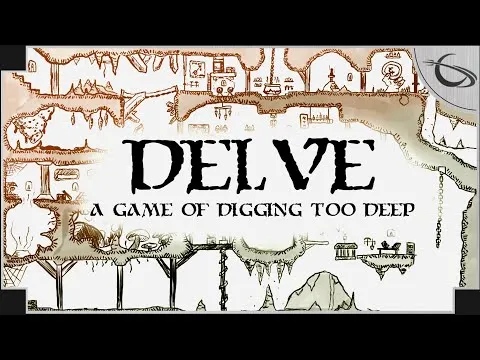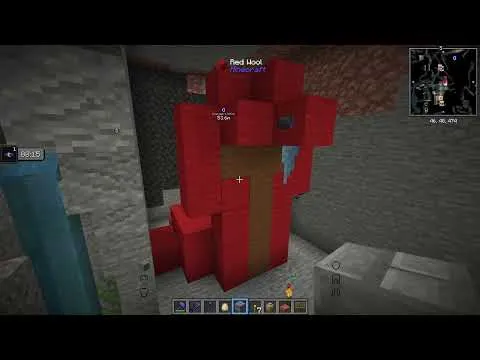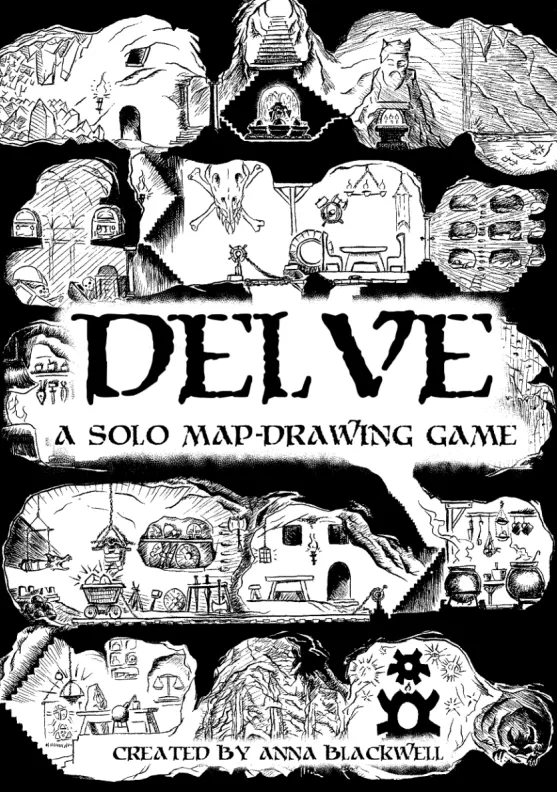

DELVE might be one of my favorite map-drawing games of all time. I guess this could be an easy statement to make as there are not a ton of map-drawing games I'm aware of... so I'll expand a bit to say: DELVE might be one of my favorite solo games to have crossed my desk this year.
What is DELVE?
DELVE is a Solo Map Drawing Game, which is exactly what it sounds like. Anna Blackwell (BlackwellWriter) has gamified the concept of cut-out side view maps in her own way in a series of games she's produced - DELVE, RISE, and UMBRA. Mechanically, they all play fairly similarly, but thematically they're all very different beasts.
In DELVE, we are the Overseer of a dwarven hold, tasked with digging deep to uncover a mysterious gemstone known as the Void Crystal. But, there are many strange, wonderous, and horrific things in the deep places - and throughout the course of your play... you're pretty likely to find more than you bargained for.
RISE puts us in the point of view of a dungeon Keeper, this time not digging down, but instead trying to grow your evil horde while carving a path to the surface so as to deal with the troublesome heroes above and spread your evil for another age.
Finally, UMBRA takes us to the stars in a future where we're exploring an alien planet for a mysterious weapon. As with DELVE and RISE, we're looking to dig into the planet to find our wonderful MacGuffin, but in this one we're also introduced to the added mechanic of building on the surface (and, with an expansion called UMBRA Stations, exploring a derelict space station & space ships).
I wanted to mention all three here since they are very similar in many core functions and I think it's valuable that you know that there are options if you prefer one style/theme over another - but from here on out, I'll be focusing on DELVE. It was the first of these that I played and has (by far) the most amount of time spent on it for me.
As someone who is both a Worldbuilder and a Game Master/Dungeon Master, I find these are wonderful ways to flesh out my world. If a Dwarven Hold fails, great, I now have an easy-made dungeon to plop into my world with a bit of history just by virtue of having played DELVE.
What do I need to play?
Thankfully, as with most of the Solo Tabletop Games I play, the physical items you need to play are almost certainly kicking around in a drawer in your house. You need:
- a pencil (and eraser)
- some paper to draw on (1-inch grids or blank as you prefer)
- a standard deck of playing cards
- a notebook/scrap paper for notes
- some kind of token (torn scraps of paper, dice, coins, m&m's, whatever you want)
And, of course, you need the rules for the game.
Now, it's important to note that these are what you need for the default way to play with the least barrier to entry. I've seen some really neat alternate styles of play thanks to the Discord community. In these cases, what you need is a PC or laptop instead of all the physical drawing tools. We'll talk more about this later, as I want to break these out into their own section.
The Mechanics
Mechanically, the game is divided into basically 5 Phases. Prior to starting, we choose our Hold's Entrance - which is suggested to be in the middle of the first row on your paper. With that done, the rest of the game marches forward in the following phases:
Exploration - Pick a spot on our paper/grid that's adjacent to an explored section on our map, and draw from our deck of playing cards to see what we find. [For those of you who've been following for a while, you'll recognize this card-based-event-sequence as a very common element of Solo Gaming]

Combat - If there is any combat, we resolve this immediately after Exploration.
Trading - The game has two currencies; Trade Goods and Resources. In this phase, we can swap between the two.
Building - Build phase is exactly what it sounds like. There are a ton of rooms you can build as part of your Hold, each providing some sort of benefit to you as Overseer. These include things like the Barracks to house more troops, Prisons to hold undesirables, Stockpiles, Shrines, etc etc etc. Beyond that, you can also choose to build Traps or Barricades, which will help hurt or delay any nasties that you might stumble upon while Delving. We spend Resources to build rooms and traps.
Recruiting - The final phase of a turn, we can choose to spend Trade Goods to hire new units. These, like the rooms, have a variety of types available. Many can only be purchased with a corresponding room. You can't hire a Mage without a Library, or have a Hound without a Kennel.
Phase Zero; Conditional Events - Finally, with Recruiting complete you're done the standard cycle - so this non-phase phase is where you'll want to resolve any conditional events. Things like checking if a Demon is spat out of the Demon Portal, or what hellish magic is generated by the Circus of Chaos as a pair of examples. There are a number of conditional checks you'll want to keep track of if you're lucky/unlucky enough to find the catalyst for these.
So, as you see here, there is - with all three, DELVE, RISE, and UMBRA - a small tactical gaming element. Which is what you use your tokens for, keeping track of where your units are is pretty useful as you will absolutely uncover stuff in the deep that you 100% want to be able to fight off. If something you unearth reaches your Entrance, the game's over, your hold is failed.
In a prior playthrough as an example, I found a slumbering Dragon deep underground. Which was great because it meant once per turn I could steal from the dragon's hoard... until it woke up and tore through my troops and destroyed my hold.
In my current playthrough, I just uncovered a demonic portal:

Which isn't so bad as it's only 20 Strength if one does happen to spawn (meaning I'd need to have 4+ soldiers to deal with it), but it's on the second level of my hold, extremely early game, and I only just hired a Cleric today while prepping for this post.
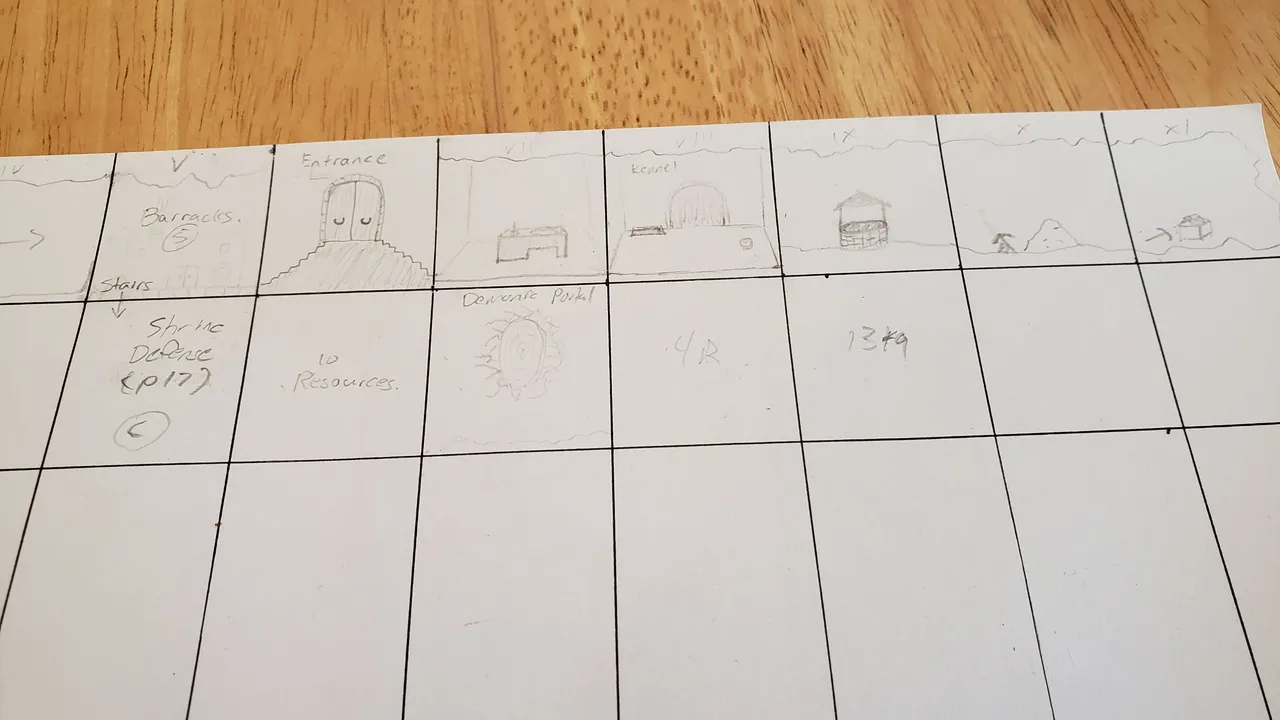
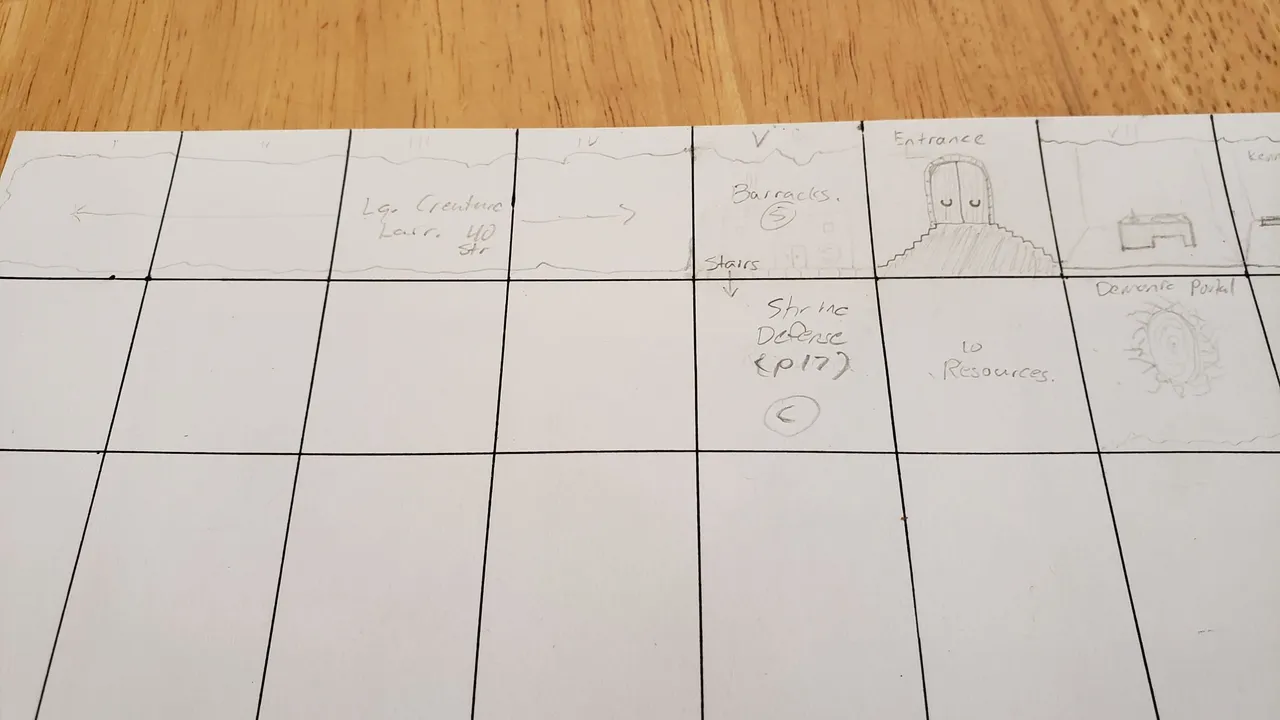
(I want to finish the game before I set ink to paper, so I apologize that this is a super light pencil drawing and hard to see.)
But I suck at drawing!
Dang folks, so do I - look at the image above, it's steaming hot garbage! But, if you're adamant that drawing just isn't for you - don't worry, because here's where we're going to touch on some really neat alternate ways to represent our Holds!
Alternate Methods to Drawing
So, thanks to the lovely community of folks on the BlackwellWriter discord, I've seen some really neat takes on how to handle the drawing element if you're not into the drawing aspect.
Excel
The first method I've seen is to use something like Excel or Google Sheets to represent your grid space, and then pull in icons to represent rooms. I've seen two users post screenshots of their Holds on the discord, and thought it was a super cool way to represent your dungeon with minimal extra steps involved.
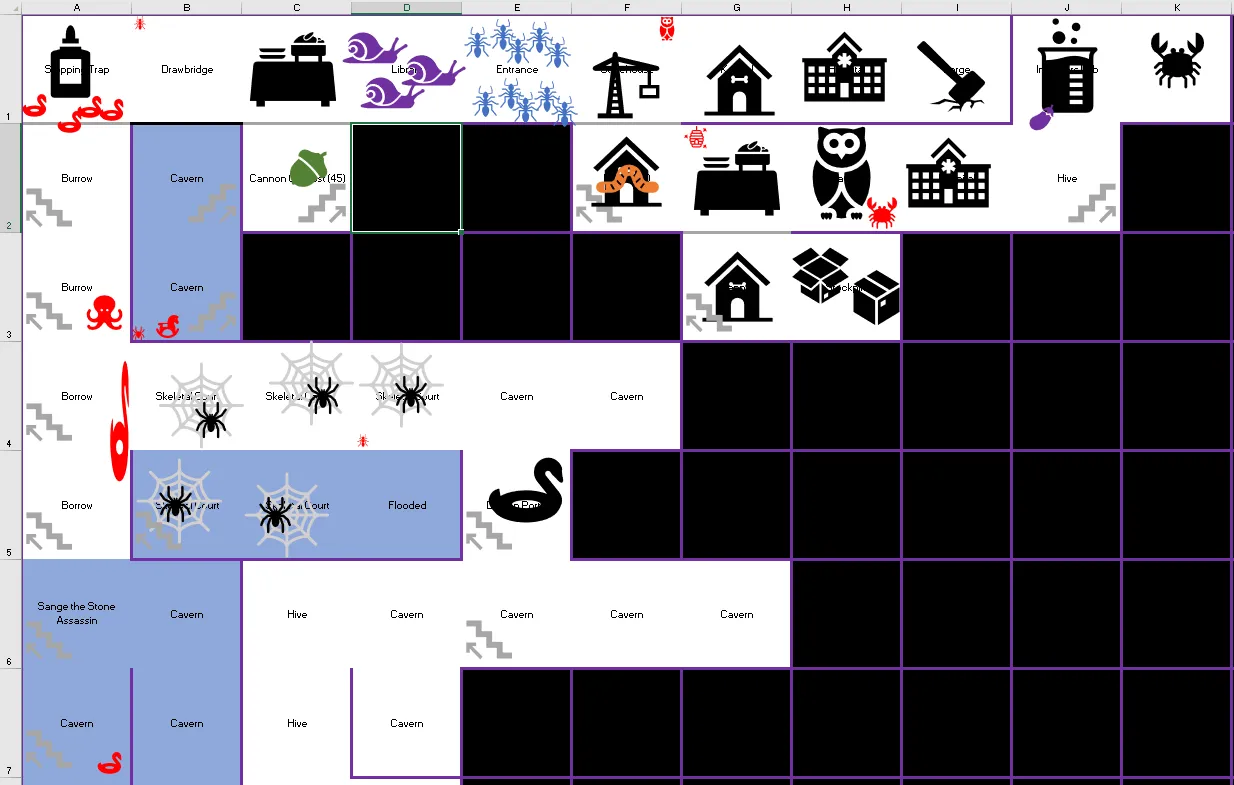
It's a nice clean way to fairly quickly represent what you need and I love it.
DungeonDraft
DungeonDraft is a paid program ($19.99USD) targetted towards top-down tabletop game masters. It's great for D&D, Pathfinder, and other similar games. A few folks have used it in clever ways though to make a sweet side-view of their Hold with clever use of the available assets. A great example of this is from Nookrium on YouTube:
I've given this method a shot a few times and I love it. It's sometimes tricky to figure out what icons I'm going to use, but I think if I dedicated an afternoon to searching for and importing assets I could probably run all my games via DungeonDraft and love the results.
Last, and certainly most impressive in my mind, is...
Minecraft
One of the members of the discord - Infernalistgamer - runs his entire game through his modded Minecraft world. It's a phenomenal use of the software, and by far the most unique and creative method I've so far seen. His Paintedsands playthrough is updated through a Thread on the discord.
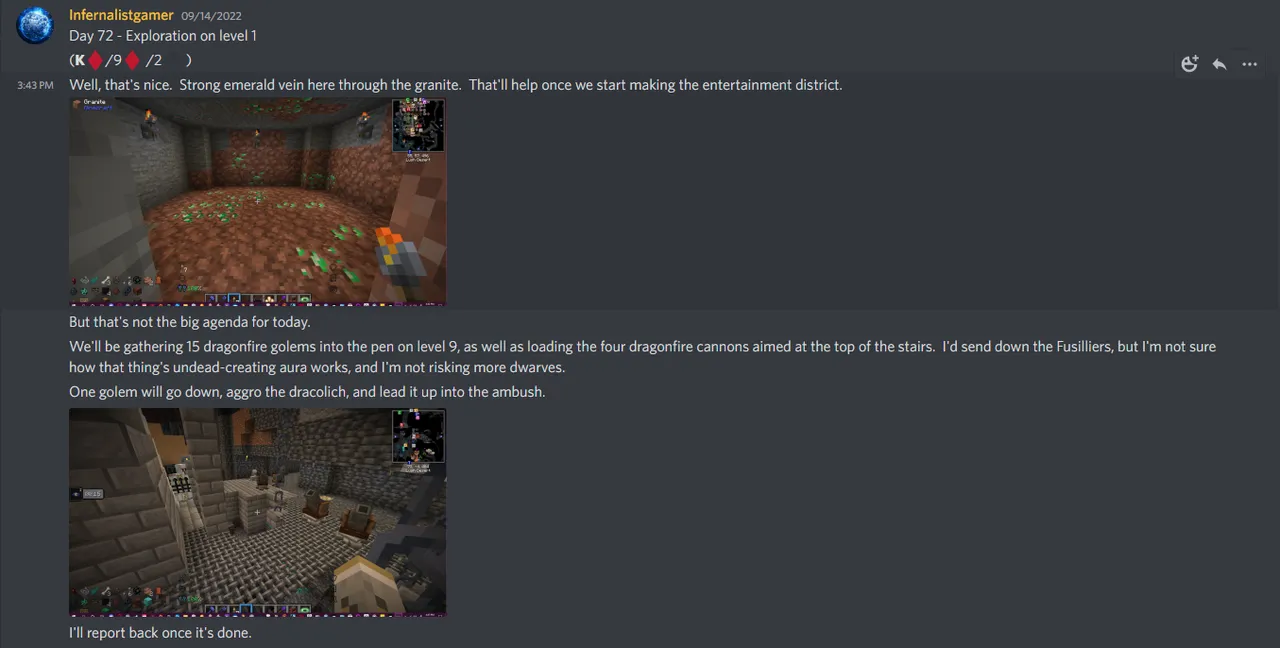
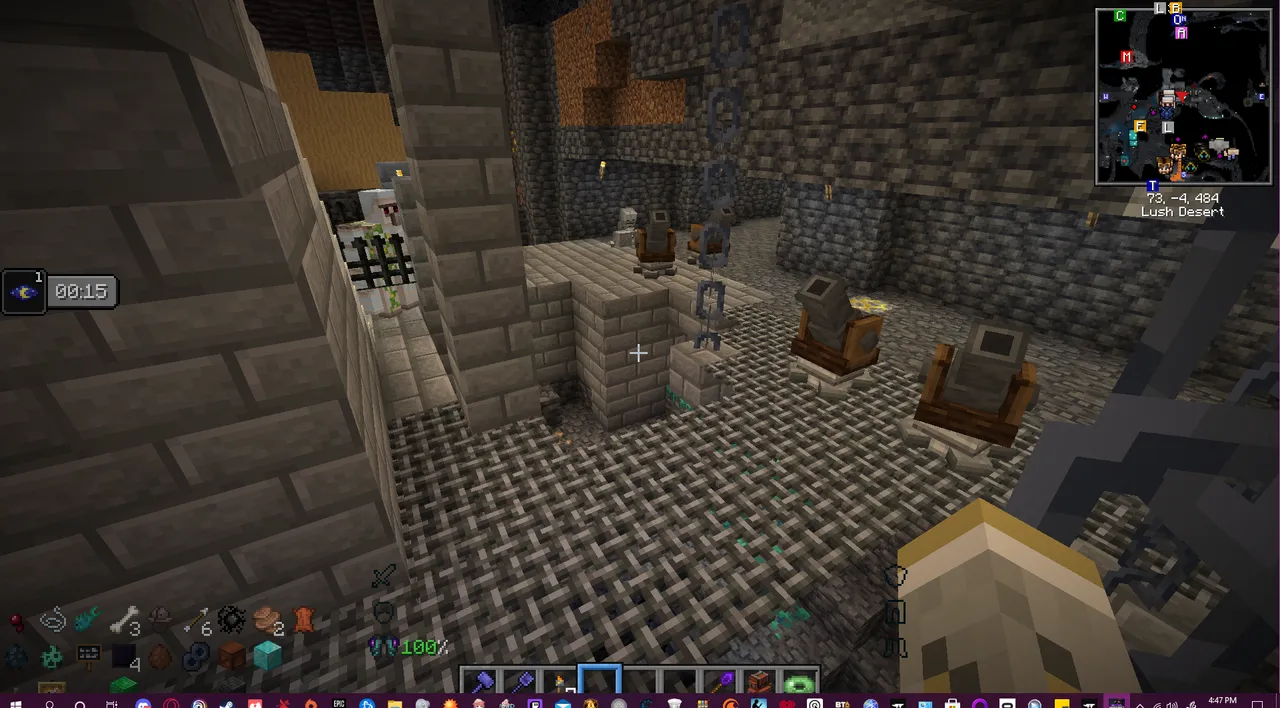
He's also been recording walkthroughs of his progress at certain points in time, and in this first episode mentions some of the mods he's using and discusses his setup, as well as walking us through this 3d Mincraft-based DELVE game he's playing.
I really highly recommend checking out his Youtube series on it, as it's a super fun way to play this game.
This is all super cool, where can I get it!?
The base DELVE game is about $8 USD, and available here: https://www.blackwellwriter.com/products/delve-a-solo-map-drawing-game
There's a number of expansions for DELVE (and RISE and UMBRA) which are currently best found on her itch page - https://blackwellwriter.itch.io/.
And, if that's not quite enough for you... She's got a Patreon option as well (https://www.patreon.com/AnnaBlackwell), and with a Hero level pledge ($9.50 USD/month) you get access to anything she's created as well as anything she creates going forward. I've been a Patreon for a while, as I quickly realized that Solo Tabletop games were my jam and getting early releases / all the games she makes helps me fuel my solo ttrpg addiction.
If you're interested in trying this game, but you're not willing to spend $8 on a pdf to try out something new and different, let me know in the comments. If there's enough interest I'll make a raffle (drawn 7 days after this post goes live) and some lucky person can get a copy for free. You'll have to get in touch with me on Discord to claim the copy - SanguineHaze#7826
And finally, thanks to @avatara for inspiring this post by asking if I'd showcased anything about DELVE in a conversation we had.


Join the Worldbuilding Community!

